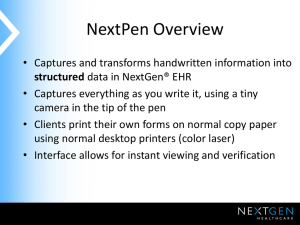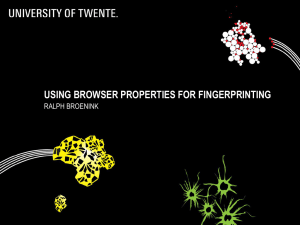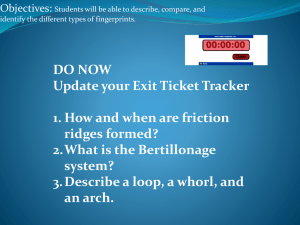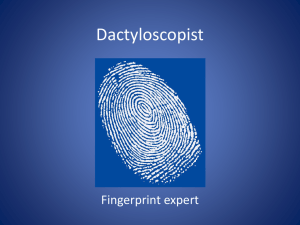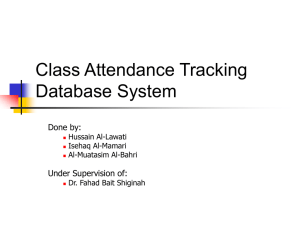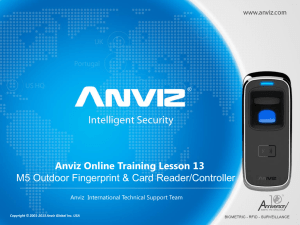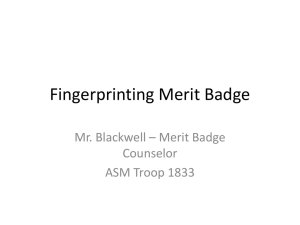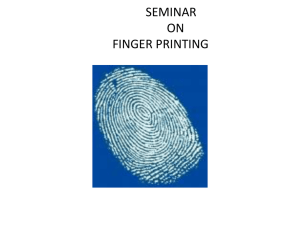FINGER PRINT BASED ELECTRONIC VOTING MACHINE
advertisement
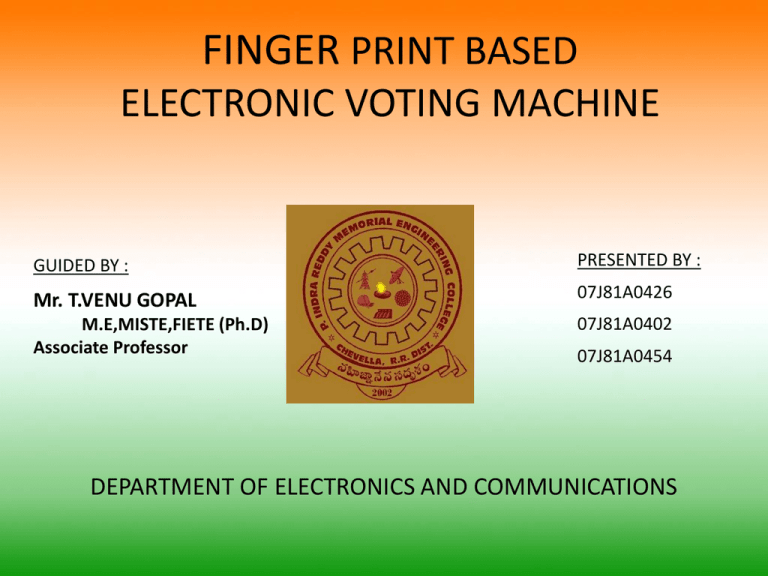
FINGER PRINT BASED ELECTRONIC VOTING MACHINE GUIDED BY : PRESENTED BY : Mr. T.VENU GOPAL 07J81A0426 M.E,MISTE,FIETE (Ph.D) Associate Professor 07J81A0402 07J81A0454 DEPARTMENT OF ELECTRONICS AND COMMUNICATIONS • The Genesis Concept of EVM (existing system) Challenge Solution (proposed system) • Tech. Background -In detail description of Power Supply (+5V,750 mA) Micro controller (AT89S52) Max 232 Finger Print Scanner (NITGEN FIM 3030) Schematic Representation • Pictorial Representation • Advantages • Conclusion The Genesis – concept of EVM ( Existing SYSTEM) • Electronic Voting Machines ("EVM"), Idea mooted by the Chief Election Commissioner in 1977. • The EVMs were devised and designed by Election Commission of India in collaboration with Bharat Electronics Limited (BEL), Bangalore and Electronics Corporation of India Limited (ECIL), Hyderabad. The EVMs are now manufactured by the above two undertakings. • An EVM consists of two units : Control Unit Balloting Unit • The two units are joined by a five-meter cable. The Control Unit is with the Presiding Officer or a Polling Officer and the Balloting Unit is placed inside the voting compartment. Sub-Units of EVM The Genesis – Challenge (Drawbacks of existing EVM) • There are two types of problems with EVM which is currently in use : Security Problems • One can change the program installed in the EVM and tamper the results after the polling • By replacing a small part of the machine with a look-alike component that can be silently instructed to steal a percentage of the votes in favor of a chosen candidate. • These instructions can be sent wirelessly from a mobile phone. Illegal Voting (Rigging) • The very commonly known problem, Rigging which is faced in every electoral procedure. • One candidate, casts the votes of all the members or few amount of members in the electoral list illegally. • This results in the loss of votes for the other candidates participating and also increases the number votes to the candidate who performs this action. • This can be done externally at the time of voting. The Genesis – Solution (Proposed System) Remedies for Security problems : • The above mentioned security problems can be solved by other means such as taking more care in keeping the EVMs safe and secure until the time of declaring the results, which can be done manually. • By placing Jammers at the Ballot vault to avoid the tampering using wireless communication (Cell Phones). • Results should be declared immediately after polling. Remedies for Illegal voting (Rigging) : • This problem can be eradicated by giving a unique id to every user so that one person can cast his vote only once. • That unique id can be “Fingerprint” of each individual. Proposed System • The main aim of the project i.e. electronic voting machine using fingerprint technology is to provide more security in authentication of a candidate contesting in elections by providing a unique identity to every user using the FINGERPRINT TECHNOLOGY provided if we maintain the fingerprints of all the voters in a Database. • Each and every user uses his fingerprint for casting his vote in the procedure of electing his choice of candidate from the list of candidates contesting in the elections conducted by The Election commission of India. • This is purely to eradicate rigging which will be helpful to elect the genuine candidates on the basis of number of votes polled to them. • Here we are using Dual security i.e. not only fingerprint id but also a unique numerical password for authentication for every user/voter. Why only Fingerprint ? • Every person in this universe has unique fingerprint. • Fingerprints are unique i.e. everyone is born with one, which states that fingerprints can be used for unique identification. • Fingerprint scanner is a device for computer Security featuring superior performance, accuracy, durability based on unique NITGEN Fingerprint Biometric Technology. • Fingerprints tech is widely used in banking, authentication etc… • Reliable and trusted Hence we opted for fingerprint technology in our project. TECHNOLOGY BACKGROUND In detail description of Block Diagram Power Supply Micro controller (AT89S52) MAX 232 Finger Print Scanner (NITGEN FIM 3030) Schematic Diagram Block Diagram Power Supply LCD Display Keypad Micro Controller Finger Print MAX Module 232 AT89S52 Security Alarm Switch Power Supply Step Down Transformer Bridge Rectifier Filter Circuit Regulator Section Power supply to All sections Microcontroller (AT89S52) • A Micro controller consists of a powerful CPU tightly coupled with memory, various I/O interfaces such as serial port, parallel port timer or counter, interrupt controller, data acquisition interfaces-Analog to Digital converter, Digital to Analog converter, integrated on to a single silicon chip. • If a system is developed with a microprocessor, the designer has to go for external memory such as RAM, ROM, EPROM and peripherals. • But controller is provided all these facilities on a single chip. Development of a Micro controller reduces PCB size and cost of design. • One of the major differences between a Microprocessor and a Micro controller is that a controller often deals with bits not bytes as in the real world application. Features of AT89S52 : • The AT89S52 is a low-power, high-performance CMOS 8-bit microcontroller. • 8K Bytes of In-System Programmable (ISP) Flash Memory – Endurance: 10,000 Write/Erase Cycles • 4.0V to 5.5V Operating Range • Fully Static Operation: 0 Hz to 33 MHz • 256 x 8-bit Internal RAM • 32 Programmable I/O Lines • Three 16-bit Timer/Counters • Eight Interrupt Sources • Full Duplex UART Serial Channel (receiver/transmitter: SBUF) • Low-power Idle and Power-down Modes • Fast Programming Time Why AT89S52 ? • Because it has 8 Kb on chip flash memory which is just sufficient for our application. • The on-chip Flash ROM allows the program memory to be reprogrammed in system or by conventional non-volatile memory Programmer. • Moreover ATMEL is the leader in flash technology in today’s market place and hence using AT 89S52 is the optimal solution. Pin Description : MAX 232 • It is 16-Pin IC known as Voltage Converter or Line Converter. • It converts the RS-232 levels of the Fingerprint Scanner to the TTL voltage levels of µC 8051. • MAX Maxim Company 232 Series number • RS Recommended Standard was set by the Electronic Industries Association (EIA) in 1960. • Using DB-9 (Data Bit) Pin connector, we’ll connect the MAX-232 to the Fingerprint Scanner. • We can connect two devices at a time to the MAX-232. MAX-232 as a interface b/w DB-9 & µC • RS-232 Voltage levels : -3V to -25V Logic-1 +3V to +25V Logic-0 • TTL CMOS Levels : +5V Logic-1 0V Logic-0 Fingerprint Scanner (NITGEN FIM 3030) • FIM3030 is an evolutionary standalone fingerprint recognition module consisted of optic sensor and processing board. • FIM 3030 includes optical module more compact and small dimension. • We Can store up to 100 Fingerprints using FIM 3030. Off-line functionality : Stores logs on the equipment memory (up to 100 fingerprints) and it’s identified using search engine from the internal algorithm. On-line functionality : • Identification – Who are you? 1 : N comparison Slower, Scan all templates in database • Authentication – Are you John Smith? 1 : 1 comparison Faster, Scan one template can be stored on non volatile memory, or be sent by RS-232 port. Security Accuracy : 97 % will return correct results 100 % Deny intruders Template is created for every fingerprint i.e. Encrypted data Image is discarded i.e. cannot reconstruct the fingerprint from data Several sensors to detect fake fingerprints Cannot steal from previous user • Latent print residue (will be ignored) Cannot use cut off finger • Temperature • Pulse • Heartbeat sensors • Blood flow Schematic Diagram Pictorial Representation Step Down T/F LCD Display (2X16) DB – 9 Connector µC AT89S52 MAX - 232 Buzzer Key Board EEPROM Fingerprint Scanner NITGEN FIM 3030 Keypad Keypad for giving numerical password Buttons for electing candidates EEPROM S EN C R • Here S SAVE BUTTON EN Enables Fingerprint Scanner C Clears the DATA R Shows the RESULT SEQUENCE OF OPERATION OF BUTTONS FOR SAVING FINGERPRINTS INTO A DATABASE SAVE FP’s LOAD FINGERPRINTS CLEAR DATA END END MASTER MODE SEQUENCE OF OPERATION OF BUTTONS FOR POLLING ENTER PASSWORD CAST YOUR VOTE If Valid Voter KEEP FINGER PRESS ENABLE SWITCH If Invalid Voter BUZZER BUZZER RESET RESET END Software's Used Keil software for C Programming • µVision3 is an IDE (Integrated Development Environment) that helps you write, compile, and debug embedded programs. It encapsulates the following components: A project manager A make facility Tool configuration Editor A powerful debugger Embedded C • It includes all the library functions required for embedded systems Express PCB for layout design Express SCH for Schematic Design Advantages • Rigging will be eliminated completely • Highly tamper – proof. • This unique fingerprint voter ID card can be used for identification purpose in Govt/Semi-Govt bodies. E.g.: When applying Passport, Driving license, etc • Preserves voting secrecy, No scope for invalid votes • Facilitates quick and accurate counting – possible to declare results instantaneously • Re-usable by simply erasing votes recorded in earlier poll • As the whole data of the fingerprints of the people is available, it can be used for identifying thieves, culprits i.e. it’ll be more helpful for Police Dept. for investigation. • Easier to manage with less demand on man-power. Limitations • Political parties may strongly oppose this new system in certain regions • Persons without fingers/hands may not cast their votes Disadvantages • Requires to build up correct database of civilians/users in advance • It’s a costly affair & time taking process Conclusion • The project “ELECTRONIC VOTING MACHINE USING FINGERPRINT Tech” has been successfully designed and tested. • This can bring a revolutionary change in the election procedures. • As the normal EVM is the burning issue in recent days, this can be a solution for all the problems. • Not only in INDIA but also in other countries the face of the election procedure can be changed drastically using this technology.
